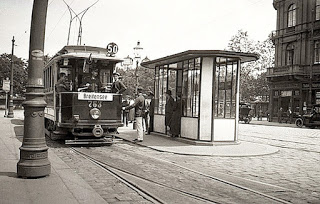
When the Austro-Hungarian empire was dissolved following the end of World War One the new nation of Austria came into being. The economic consequences for this country was a drastic devaluation of the krone (or Crown) and inevitable hyperinflation. The following short article in the December 1921 issue of the University College Magazine is a chilling report of the privations suffered by academics in Austria and other countries in central Europe:
As a result of the privations which they had to undergo, ten per cent of the professors in Austria died between1918 – 20. Consumption is usually the first symptom---and that means the end is not very far off when there are no supplies of fresh milk and nourishing food, with nothing but a chilly room in the heart of winter, and no fire in the grate.
On October 15th 1921, one tin of milk in Vienna cost kr. 240, and today, since the appalling crash of the krone, probably costs 500 at least. A professor’s weekly salary therefore would be entirely expended on the purchase of three tins of milk.
The case of a Professor of Egyptology---met personally by the present writer in Vienna—is typical of many. He was working many hours every day as a clerk in the tramway office. Imagine---and pardon the suggestion—Professor Flinders Petrie filling up returns of ‘bus tickets, at the headquarters of the L.G.O.C, and being proud to have obtained such dignified work.
Eighty to 120 thousand kronen is the average salary of a professor. At present exchange rates this represents a maximum of £10 a year.
Try to imagine a professor in the University of London living on £10 a year!!
And the lot of a student is by no means brighter.2,000 kronen, the average monthly income of about 7,000 Austrian students will now buy 3s 6d, or a pound.
But there is fortunately a happier side to this otherwise gloomy picture.
The Universities of twenty-nine different countries banded themselves together last year to save, in so far as they could, the thousands of students and professors in the Universities of Central Europe. The £150,000 raised “fulfilled a noble purpose”, as Sir Maurice de Bunsen, former British Ambassador in Vienna wrote, “in keeping alight the torch of learning in countries where its brilliancy has been overshadowed by the national disaster.”
Let us all unite again this year and continue this splendid work.
Complete guarantees have now been obtained which warrant us starting relief work immediately in the Russian Universities. Your help is needed to make this possible.
[L.W.Harford]
